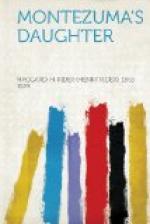‘Alas!’ he wailed, ’and alas! I see the streets of Tenoctitlan red with blood and fire, I see her dead piled up in heaps, and the horses of the Teules trample them. I see the Spirit of my people, and her voice is sighing and her neck is heavy with chains. The children are visited because of the evil of the fathers. Ye are doomed, people of Anahuac, whom I would have nurtured as an eagle nurtures her young. Hell yawns for you and Earth refuses you because of your sins, and the remnant that remains shall be slaves from generation to generation, till the vengeance is accomplished!’
Having cried thus with a great voice, Cuitlahua fell back upon the cushions, and before the frightened leech who tended him could lift his head, he had passed beyond the troubles of this earth. But the words which he had spoken remained fixed in the hearts of those who heard them, though they were told to none except to Guatemoc.
Thus then in my presence and in that of Otomie died Cuitlahua, emperor of the Aztecs, when he had reigned but fifteen weeks. Once more the nation mourned its king, the chief of many a thousand of its children whom the pestilence swept with him to the ‘Mansions of the Sun,’ or perchance to the ‘darkness behind the Stars.’
But the mourning was not for long, for in the urgency of the times it was necessary that a new emperor should be crowned to take command of the armies and rule the nation. Therefore on the morrow of the burial of Cuitlahua the council of the four electors was convened, and with them lesser nobles and princes to the number of three hundred, and I among them in the right of my rank as general, and as husband of the princess Otomie. There was no great need of deliberation, indeed, for though the names of several were mentioned, the princes knew that there was but one man who by birth, by courage, and nobility of mind, was fitted to cope with the troubles of the nation. That man was Guatemoc, my friend and blood brother, the nephew of the two last emperors and the husband of my wife’s sister, Montezuma’s daughter, Tecuichpo. All knew it, I say, except, strangely enough, Guatemoc himself, for as we passed into the council he named two other princes, saying that without doubt the choice lay between them.
It was a splendid and a solemn sight, that gathering of the four great lords, the electors, dressed in their magnificent robes, and of the lesser council of confirmation of three hundred lords and princes, who sat without the circle but in hearing of all that passed. Very solemn also was the prayer of the high priest, who, clad in his robes of sable, seemed like a blot of ink dropped on a glitter of gold. Thus he prayed:




